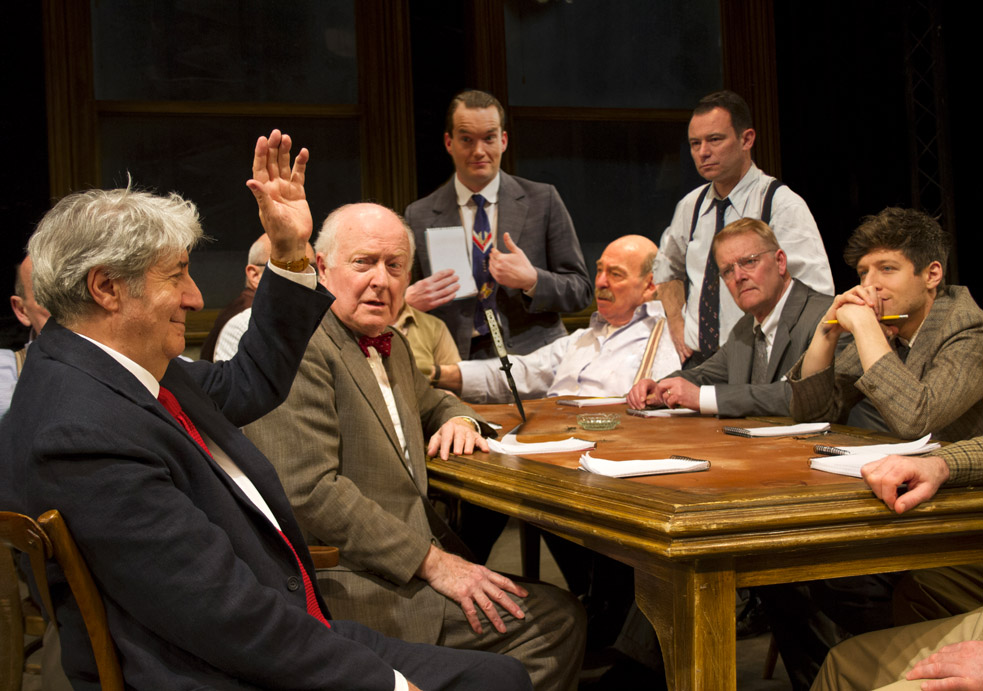Court room dramas always cast a spell whether in real life or on stage or screen. They satisfy some very fundamental human need, not least because they give us a deep and intrusive insight into other people’s lives. We can live the excitement, and often horror, vicariously, we can be opinionated, we can say I told you so, all without getting involved. But what if you are involved, what if your opinion is a matter of life or death, literally in the case of Twelve Angry Men.
The play presents, like The Dock Brief which was on at the Everyman Cheltenham last year, a court room drama without the court room – in the cells in the John Mortimer play and in the jury room for Reginald Rose’s Twelve Angry Men. Both plays give a different perspective on the usual format. InTwelve Angry Men a young man, we presume black, is accused of killing his father. It has been established he owns the knife, there is an eye witness to the stabbing and people have heard an argument and seen the accused leaving the scene. Pretty cut and dry, except in the jury room where one of the twelve is a dissenter. For the next two hours he sets about changing the minds of the others.
The play is, like all good drama, character, not story based. The title may be a bit of a giveaway but Twelve Angry Men has twelve great characters, thirteen if you count the guard. Juror 8 (none of them have names) is the mild-mannered, quiet, wouldn’t-hurt-a-fly type who, it turns out has a rod of steel running through him. He doesn’t try to persuade the eleven others they are wrong, he invites them to explore themselves and in doing so see reason. It’s not about truth, it’s about reason. Nobody can know the truth in any situation, it’s a subjective business, but can you send someone to the electric chair if you are not convinced of their guilt beyond any reasonable doubt. And that’s what Juror 8 does – slowly but surely he sows the seeds of doubt.
Tom Conti is ideally cast in the Henry Fonda/James Stewart type role, his easy going manner soothing the more volatile elements from a cross-section of 1950s New York society. They are all there – the bigot, the young guy from the same side of the tracks as the accused, a couple of besuited and respectable city types and another with anger management issues. It is rare you see such a large ensemble piece with all the links in the chain equally strong. There wasn’t a bad performance to be seen – in fact I would go as far as to say they were all outstanding. The one that particularly shone was Andrew Lancel who had perhaps the meatiest part as the guy wrestling with his own demons. His was a tour de force performance. I also liked Dennis Lill as the loud mouth bigot who could not see past his prejudices but, as I said, they were all excellent and each could have been picked out for praise.
Visually it was also impressive. Very American with the structure of a skyscraper looming over the jury room which, although stylised, felt very real.
One little touch I liked – there is always a problem with drama of any type that involves sitting round a table. How do you avoid the actors having their back to the audience? In Twelve Angry Men the large table in the centre of the room around which they sit slowly, imperceptibly rotates. So slow, it’s like the hands on a clock, you don’t notice until you look up and realise it’s in a different place.
So, Twelve Angry Men comes highly recommended from this reviewer. You’ll have to go a long way and wait a long time for such a display of acting in such a riveting piece of drama. A great, faultless ensemble piece. ★★★★★ Michael Hasted 03/02/15 at Cheltenham
Photo by Anton Belmonte


